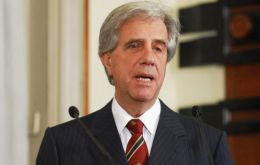MercoPress. South Atlantic News Agency
Tag: Luis Lacalle Pou
-
Tuesday, November 19th 2019 - 23:41 UTC
Uruguay presidential elections: Lacalle Pou would widely win, according to polls

After a long election campaign, Uruguayans live the last days before the second round of the presidential elections, which will take place on Sunday, November 24. The latest polls before the ballotage positions the nationalist Luis Lacalle Pou as the next president of the country, breaking the hegemony of the left that the Frente Amplio (Broad Front) imposed in the last 15 years.
-
Thursday, November 14th 2019 - 09:57 UTC
Uruguay presidential debate focused on economy and security ahead of the ballotage on November 24

In a tense debate a week and little of the second round of the presidential election in Uruguay, on Wednesday night the candidates offered profound differences both in terms of economy, public security and the country's positioning in foreign policy mentioning the dictatorship of Venezuela.
-
Monday, October 28th 2019 - 09:58 UTC
Winds of change in Uruguay: ruling coalition stumbles, next government will be “multicolor”

Winds of change have swept in Uruguay. After fifteen years in office, and enjoying an absolute legislative majority, the Broad Front could lose control of the Executive on 24 November, when a runoff is scheduled among the two most voted candidates this Sunday.
-
Saturday, October 26th 2019 - 09:59 UTC
Uruguay votes on Sunday with a strong forecast change in the air

Uruguayans head to the polls on Sunday to elect a new president, 30 senators and 99 Lower House members. If none of the eleven presidential candidates manages 50% of cast votes plus one on 27 October, a runoff between the two hopefuls with most support is scheduled for 24 November.
-
Wednesday, October 23rd 2019 - 21:54 UTC
Uruguay Sunday’s general election: To a second ballotage and without parliamentary majority

On Sunday, October 27, in Uruguay, a new president, and Parliament will be elected. According to pollsters, the same parties as in 2014, the official Frente Amplio (FA, Broad Front) and the conservative National Party, will go on second ballotage in November. However, the novelty is that the Legislature will be made up of a minimum of six parties (a historical record) and a maximum of nine.
-
Tuesday, October 8th 2019 - 09:56 UTC
Uruguayan election: “a ponies race, no thoroughbreds competing”

On Sunday 27 October the Uruguayan electorate will be voting for a new president (there is no immediate reelection) and a renewed Legislative, 30 Senators and 99 Lower House members. Uruguay is one of the more stable countries in the region, both it's solid institutions as well as its citizens who are deeply committed to democracy, social rights and a strong presence of government in the economy.
-
Monday, July 1st 2019 - 09:59 UTC
Uruguay: No surprises in a primary with a record of candidates

In a primary election full of new faces and overshadowed by accusations of “dirty” campaigns, there were no surprises in the results of the internal elections of Uruguay's main political parties, according to the data of the pollsters. Daniel Martínez (Frente Amplio), Luis Lacalle Pou (National Party) and Ernesto Talvi (Colorado Party) will represent the three parties with the greatest adhesion in the country, starting a new stage in the national elections in October.
-
Thursday, June 20th 2019 - 09:59 UTC
Uruguay holding presidential primaries on 30 June: three main candidates outstand

The last Sunday of June Uruguay will be holding presidential primaries when political parties will be choosing their candidates for the coming election scheduled for next October. There are over a dozen hopefuls, but only three, maybe four or five can be considered sufficiently strong as to be taken into account. After all from one of these parties will come the next president of Uruguay, since there is no consecutive reelection in Uruguay.
-
Wednesday, December 3rd 2014 - 09:31 UTC
Analysts anticipate 'painful adjustment' for Uruguay if there is a continuity of current policies

High inflation, relatively weak economic growth and an exhausted growth model are forecasted for Uruguayan president-elect Tabare Vazquez second administration as of next March, according to the latest report from two Capital Economics analysts.
-
Tuesday, December 2nd 2014 - 05:02 UTC
US wants to continue with president-elect Vazquez the “vibrant relationship” developed with Mujica

Secretary of State John Kerry congratulated on Monday Uruguayan president-elect Tabare Vazquez on his Sunday victory, and said that the US looks forward to working with the new administration and to continue advancing with the “vibrant relationship we have had” under the leadership of President Jose Mujica.
